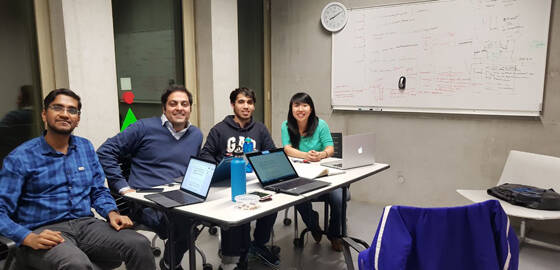Team Kilowatt Aims to Light up Hult Prize Finals
Four HEC students arrive in London on Friday March 9 hoping to take top spot in the 10th Hult Prize, the world’s largest student competition for the creation of new social businesses. They will be vying with 55 other teams in the Regional Finals over the March 9-11 weekend, with the winners advancing to a final round in New York in September. The winning team in the U.S. goes home with a million dollars in start-up funding to develop what the organizers say is “the most radical and breakthrough idea to solve one of our world’s toughest issues.” HEC’s Team Kilowatt is confident it could hold just that idea.

Since October 1, 2017, Jennifer Lu (MSc Sustainability & Social Innovation - SASI), Sarim Hassan, Toms Mathew and Paavan Bhargava (all MBA) have been forging a program with the deceptively simple subtitle “Changing the Way the Urban Poor Cooks.” This project is designed to win what has been nicknamed the annual Nobel Prize for students. Last November, the quartet’s pitch on the HEC campus won them a ticket to compete in one of 15 regional finals happening around the world this month. The last time HEC Paris competed in these London finals was in 2014. At the time, the Bee Healthy proposal to help diagnose diabetes in urban slums brought five Master’s students the top regional prize. Not to mention a ticket to a summer incubator in Boston and the global finals six months later.
For this year’s award, the HEC team continues to work in an urban slum environment, this time with a project focusing on affordability of clean cookstoves, employment and entrepreneurship opportunities for the urban poor (especially women), while also reducing inefficient forms of energy use, CO2 emissions, and household air pollution. “We’ve called it Team Kilowatt and created a business model to make cooking in urban slums more energy efficient,” explains Sarim Hassan. “Few people are aware that in my native India, for example, the most common health problems in our slums are linked to respiratory diseases. Almost 90% of people living there die of these illnesses, many of which are linked to households using solid cooking fuels.”
Environmental engineer Jennifer Lu notes that a quarter of global black carbon emissions are due to burning solid fuels. “It’s not surprising,” she adds, “given that around 3 billion people use firewood and dung cakes to cook food.” According to WHO’s Global Burden of Disease 2012, cooking-related emissions has led to around 1.6 million premature deaths in India alone.
This is one reason the team is focusing its pilot project on Mumbai’s Dharavi slum, home to over almost a million people. The third-largest slum in the world, Dharavi is one of the densest areas on the planet. “Our idea is to root the project in scalability, innovation and impact,” explains Agra-born Paavan Bhargava. “We aim to educate the urban poor in the benefits of cooking outside the home, empowering them to set up a profit-sharing model where each person is an entrepreneur.”
Since their November victory at the local finals, Team Kilowatt has been refining its pitch thanks to field studies, mentoring, and hard practice. “A couple of us flew to India in December to better understand the realities on the ground,” says Toms Mathew who’s originally from the south Indian state of Kerala. “There, we visited startup founders like IKP Eden in Bangalore who propose solutions for the bottom of the pyramid sector. It made us appreciated the scale of the journey ahead,” added Sarim modestly.
At the same time, the HEC students gleaned advice from sustainable management specialist and HEC alumni Robin Bonsey who works at Hystra. Meanwhile, Paavan and Jennifer exchanged with large energy companies like ENGIE in Paris to develop a greater understanding of this project-related sector. To better plan the scalability of the Team Kilowatt project, Toms visited Dubai’s Gulfood exhibition where he gained perspective on industry-wide cost structures and opportunities.
The preparation for the finals has become an all-encompassing group effort. “The MBA and SASI community of students have been very supportive,” insists Sarim. “They’ve helped improve our pitch after every iteration. And we also connected with previous participants in the Hult Prize to learn from their experiences” The four students were further coached by professors Michel Safars and Laurence Lehmann Ortega in the art of pitching and innovative business models.
“This time round, the HEC team is proposing a very complete solution,” observes SnO executive director Bénédicte Faivre-Tavignot who was heavily involved in the 2014 Hult Prize campaign. “Team Kilowatt is proposing solutions to a health and environmental crisis, women empowerment, microfranchising for grassroots entrepreneurs and access to markets. Beyond this award, I can imagine this project really taking off with dynamic big business partnerships. That is why the SnO Center is fully backing this initiative.”